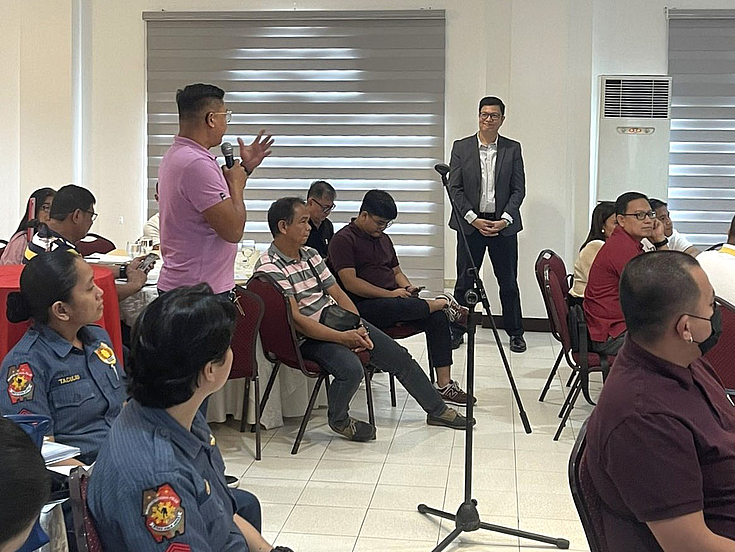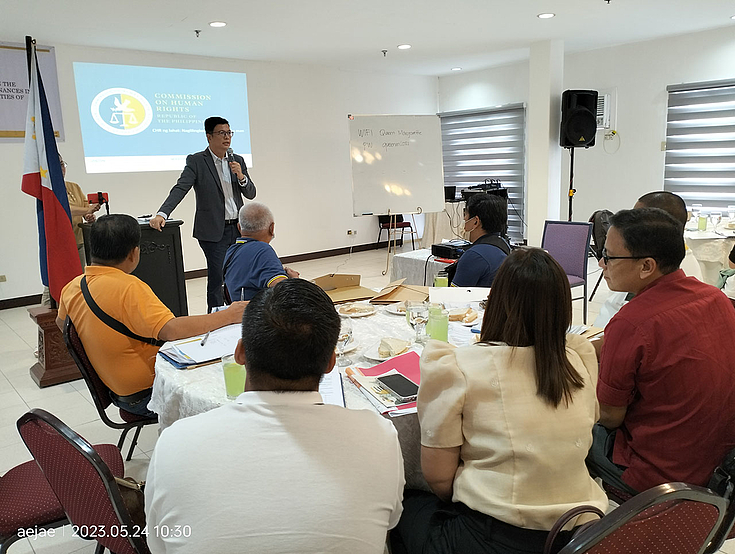Community-based Dialogues Project (CBD)
CBD on Human Rights Legislations by Local Government Units
CHR
The activity achieved its objectives (i) to present to local legislators and legal officers unique opportunities for crafting ordinances that have human rights impact in their respective localities; (ii) for resource persons to discuss and orient the participants on the laws and issuances that call for affirmative actions on the part of local government units pursuant to the State duty to fulfill human rights; and (iii) for resource persons also to share first-hand experience in human rights legislation, discuss the process as well as challenges in the implementation of their ordinances.
It was attended by more than 50 participants comprising of city and municipal vice-mayor, councilors, and legal officers from different LGUs, Quezon Police Provincial Office, local government agencies, and officers and staff of CHR IV-A led by its Regional Director, Atty. Rexford Guevarra. HSF representative attended online.
Proposed human rights ordinances were discussed, viz: (i) Establishing and Operationalizing the Barangay Human Rights Action Team (BHRAcT); (ii) Localization of Article I of Republic Act No. 11313 or Safe Spaces Act; (iii) Establishment or Designation of Freedom Parks; and (iv) Comprehensive Anti-Discrimination Ordinance and (v) Human Rights Defenders Protection Ordinance. CHR IV-A officers gave the presentations and facilitated the discussions.
Ms. Aileen C. Edades, Division Chief, Promotion and Advocacy Division presented the Human Rights Action Center and Rule of Law (HRAC and RoL) program of the CHR. She noted the CHR-DILG Joint Memo Circular No. 1, s. 2014 on “Mainstreaming Human Rights Through Rule of Law and Access to Justice at the Level of Provinces, Cities, Municipalities and Barangays” adding that the program supports good local governance, access to justice, and peace and development. She cited the legal bases for the creation of a Human Rights Committee at the LGU level and the Barangay Human Rights Action Centers (BHRACs). She explained the HRAC and RoL mandate, strategies, structure at the national and local levels, major services, and the role of LGUs towards the promotion and protection of human rights. She mentioned one of the strategies employed by the HRAC and RoL program which is the creation of Human Rights Action Teams (HRAcTs).
Atty. Diana B. Samaniego-Gamo from the Legal Division presented the Localization of Article 1 of Republic Act No. 11313 or the Safe Spaces Act of 2019. She highlighted the CHR IV-A Advisory on the localization of Art. 1 (Gender-based streets and public spaces sexual harassment) in the cities and municipalities of Region IV-A, and the duties of LGUs.
Atty. Jack Benigno A. Diamante also from the Legal Division presented the Establishment or Designation of Freedom Parks. He shared a definition of freedom park, and the need for it, noting that this is a right guaranteed under the United Nation's (UN) International Covenant on Civil and Political Rights (ICCPR) which includes the rights of the people to hold opinions without interference and freedom of expression. He discussed Batas Pambansa (BP) Blg. 880 or the Public Assembly Act of 1985 which mandates LGUs to establish or designate at least one suitable freedom park centrally located within the LGU for public assemblies without the need for a permit. He mentioned the Local Government Act of 1991 in relation to the LGU’s mandate to provide freedom/public park/s as a basic service, as well as DILG Memo Circular No. 2006-42 which provides the guidelines for the establishment or designation of freedom park/s in accordance with Section 15 of BP Blg. 880.
CHR
CHR IV-A Regional Director, Atty. R. Guevarra presented the Comprehensive Anti-Discrimination Ordinance and Human Rights Defenders Protection Ordinance. He cited the legal bases for the former such as the Universal Declaration of Human Rights (UDHR) and the 1987 Philippine Constitution. He gave a definition of discrimination which is any distinction, exclusion, restriction or preference that is directly or indirectly based on protected attributes such as age, origin, sex, gender, etc. He also mentioned prohibitions, exceptions, and examples of acts of discrimination. While a national bill is pending in Congress, he shared that in Region IV-A, there are several LGUs (12) which have enacted anti-discrimination ordinances based on their unique complexities.
On the Human Rights Defenders (HRD) Protection Ordinance, Atty. Guevarra made references to the UDHR which provides a declaration of rights and freedoms of human rights defenders; Anti-Torture Act of 2009; and Anti-Enforced Disappearance Act in support of this ordinance. He gave a definition of the following terms: Human Rights Defenders, Human Rights Violation, Intimidation or Reprisal, and Public Authorities. He noted that there are limitations on HRD rights such as those set by law and reasonable requirements of public order and general welfare. He mentioned the obligations of public authorities in the protection of HRDs, notably, to facilitate the activities and work of HRDs, to ensure protection from arbitrary or unlawful intrusion or interference, and to assist in investigation, among others. He also cited local protective mechanisms for HRDs such as coordination/cooperation with CHR, and legal and psychosocial assistance for high-risk HRDs and their families. The CHR acknowledged Isabela City in Basilan as the first LGU to have a HRDs’ protection ordinance.
For the Sharing of Enacted Ordinances, municipal councilors and legal officer from Laguna shared their experiences in crafting their respective human rights ordinances. They noted that the ordinances help empower the citizens toward community participation, facilitate filing of complaints as citizens feel protected, encourage local legislators to enact policies to protect human rights, and in the designation of BHRAOs. Some challenges include hard to convince fellow legislators to support human rights-related ordinances, lack of awareness on human rights, and limited number of BHRAOs/inactive BHRACs.
An open forum was facilitated by Ms. E. Edades, followed by the closing remarks of Atty. Samaniego-Gamo who thanked the participants for their invaluable contributions to the activity.
Finally, Certificates of Participation were handed out to the participants and the activity was capped by a group photo.


